Generative AI in Operations
The food and beverage manufacturing industry is under immense pressure to deliver high-quality products efficiently, sustainably, and profitably. Supply chain managers find themselves balancing tight deadlines, fluctuating demand, regulatory requirements, and cost management, all while navigating unpredictable market conditions. Enter generative AI—an advanced form of artificial intelligence capable of transforming operations by enabling deeper insights, faster decision-making, and enhanced supply chain resilience.
In this blog, we explore how generative AI can revolutionize supply chain operations in the food and beverage sector, especially when integrated with advanced planning systems like PlanetTogether and enterprise solutions such as SAP, Oracle, Microsoft, Kinaxis, or Aveva.
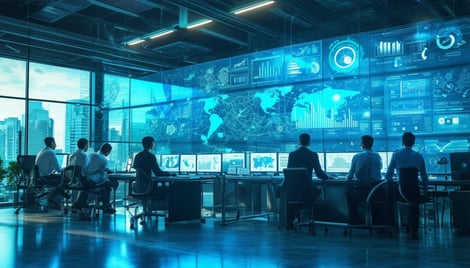
What Is Generative AI?
Generative AI is a branch of artificial intelligence that leverages algorithms to generate new content, designs, simulations, or recommendations based on historical data. Unlike traditional AI models that focus on pattern recognition or prediction, generative AI creates new possibilities, making it highly valuable for complex and dynamic industries like food and beverage manufacturing.
Some applications of generative AI in the supply chain include:
Optimizing production schedules.
Generating demand forecasts.
Creating simulation models for supply chain scenarios.
Improving inventory management.
Innovating product formulations and packaging designs.
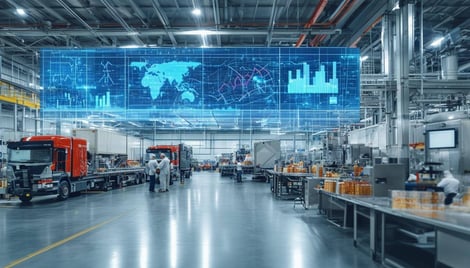
The Role of Generative AI in Supply Chain Optimization
Demand Forecasting and Planning
Generative AI can analyze historical sales data, external market trends, and even real-time consumer behavior to predict demand patterns with unprecedented accuracy. This is especially critical in the food and beverage industry, where perishability and seasonal demand spikes are major challenges.
For example, when integrated with PlanetTogether and ERP systems like SAP or Oracle, generative AI can:
Provide dynamic forecasting models that adapt to market changes.
Simulate demand scenarios to assess the impact of promotional campaigns or economic fluctuations.
Automatically adjust production plans to align with real-time demand shifts, reducing waste and stockouts.
Production Scheduling
Efficient production scheduling is the cornerstone of any successful supply chain. Generative AI can create optimized schedules by considering variables such as raw material availability, machine capacity, labor constraints, and delivery deadlines.
Through integration with PlanetTogether, supply chain managers can:
Automate scheduling adjustments based on real-time disruptions like equipment breakdowns or delayed shipments.
Simulate different scheduling scenarios to identify the most cost-effective and efficient plans.
Leverage data from ERP platforms like Microsoft Dynamics or Kinaxis to ensure alignment across departments.
Inventory Optimization
Excess inventory leads to higher carrying costs, while insufficient stock risks production halts. Generative AI can analyze historical inventory levels, supplier performance, and consumption trends to create inventory strategies that balance these extremes.
When integrated with systems like Aveva or SAP, generative AI enables:
Real-time inventory monitoring and automatic replenishment triggers.
Simulations of supply chain disruptions to develop contingency plans.
Reduced waste through precise inventory planning, especially for perishable goods.
Sustainability and Waste Reduction
Sustainability is a growing priority in food and beverage manufacturing. Generative AI supports sustainability goals by optimizing resource usage, reducing waste, and improving energy efficiency.
Through integration with PlanetTogether and platforms like Oracle Cloud SCM, supply chain managers can:
Simulate the environmental impact of various production and transportation scenarios.
Optimize raw material procurement to minimize waste.
Generate eco-friendly packaging designs and formulations.
Risk Management and Resilience
Supply chain disruptions—whether due to natural disasters, geopolitical tensions, or supply shortages—can cripple operations. Generative AI enhances resilience by simulating potential risks and generating mitigation strategies.
Integration with systems like Kinaxis RapidResponse enables:
Real-time risk detection and scenario analysis.
Proactive adjustments to procurement and production plans.
Enhanced supplier collaboration through predictive insights.
![]()
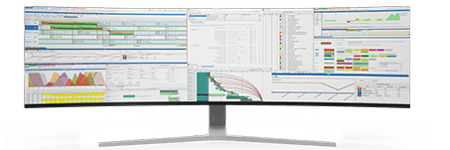
Unlocking the Full Potential: Integration with PlanetTogether and ERP Systems
While generative AI is powerful on its own, its true potential is unlocked when integrated with advanced planning and ERP systems. Here's how such integration works in a food and beverage manufacturing setup:
PlanetTogether and SAP
By connecting generative AI tools to PlanetTogether and SAP S/4HANA, supply chain managers can access a unified platform for planning and execution. AI-generated forecasts feed directly into SAP’s MRP modules, while PlanetTogether optimizes production schedules based on real-time insights.
PlanetTogether and Oracle
Oracle’s cloud-based ERP solutions provide a robust foundation for supply chain data management. When integrated with PlanetTogether, generative AI can leverage Oracle’s comprehensive data to simulate supply chain scenarios, identify bottlenecks, and propose actionable solutions.
PlanetTogether and Microsoft Dynamics
Microsoft Dynamics offers seamless data sharing across departments. Generative AI, combined with PlanetTogether, can utilize this data to create dynamic production schedules, align them with financial goals, and ensure regulatory compliance in food safety.
PlanetTogether and Kinaxis
Kinaxis excels in scenario planning and real-time supply chain visibility. When paired with generative AI, it can provide PlanetTogether with the ability to generate adaptive schedules that respond to disruptions while maintaining cost and efficiency targets.
PlanetTogether and Aveva
Aveva’s focus on industrial digital transformation makes it an ideal partner for generative AI applications in manufacturing. Integration with PlanetTogether allows supply chain managers to simulate end-to-end production and distribution scenarios, ensuring robust operational plans.
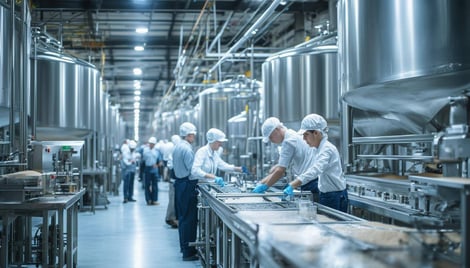
Overcoming Challenges in Generative AI Implementation
Adopting generative AI in the supply chain comes with its challenges, including:
Data Quality: Poor-quality data can lead to inaccurate AI models. Investing in robust data management systems is essential.
Change Management: Employees may resist AI-driven changes. Providing training and demonstrating AI’s benefits can ease the transition.
Integration Complexity: Integrating AI with existing systems like PlanetTogether, SAP, or Oracle requires careful planning and technical expertise.
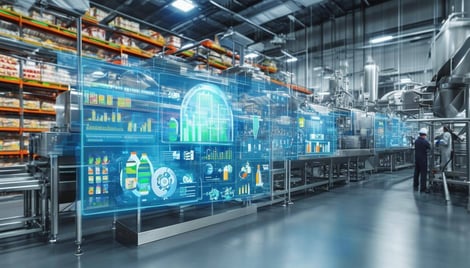
The Future of Generative AI in Food and Beverage Supply Chains
As generative AI continues to evolve, its applications in supply chain management will expand. Future innovations may include:
Fully autonomous supply chains powered by AI.
Advanced sustainability modeling to achieve net-zero goals.
Hyper-personalized production based on real-time consumer preferences.
For supply chain managers in the food and beverage industry, generative AI offers a powerful tool to navigate complexity, drive efficiency, and achieve sustainable growth. By integrating this technology with platforms like PlanetTogether and ERP systems, businesses can unlock unparalleled operational excellence.
Generative AI represents a paradigm shift for supply chain management in food and beverage manufacturing. When integrated with systems like PlanetTogether, SAP, Oracle, Microsoft Dynamics, Kinaxis, or Aveva, it empowers supply chain managers to make smarter, faster, and more sustainable decisions. While challenges remain, the potential benefits—improved efficiency, reduced waste, enhanced resilience, and greater profitability—make generative AI a must-have for forward-thinking organizations.
Are you ready to transform your supply chain with generative AI? Start your journey by exploring the integration possibilities with PlanetTogether and your existing ERP system. The future of food and beverage manufacturing is here—don’t miss out.
Topics: Inventory Optimization, PlanetTogether Software, Integrating PlanetTogether, Demand Forecasting and Planning, Food and Beverage Manufacturing, Sustainability and Waste Reduction, Risk Management and Resilience





















LEAVE A COMMENT